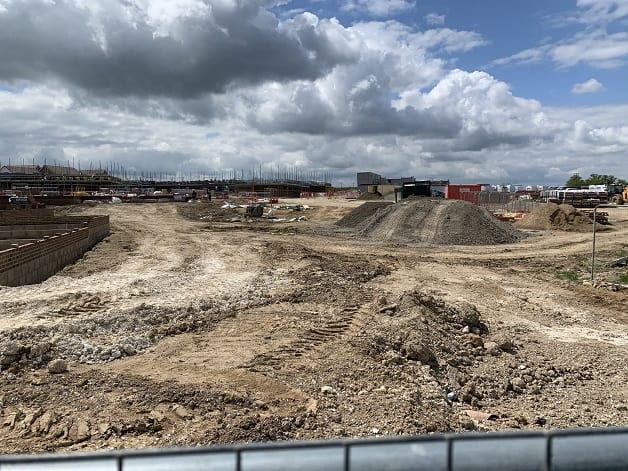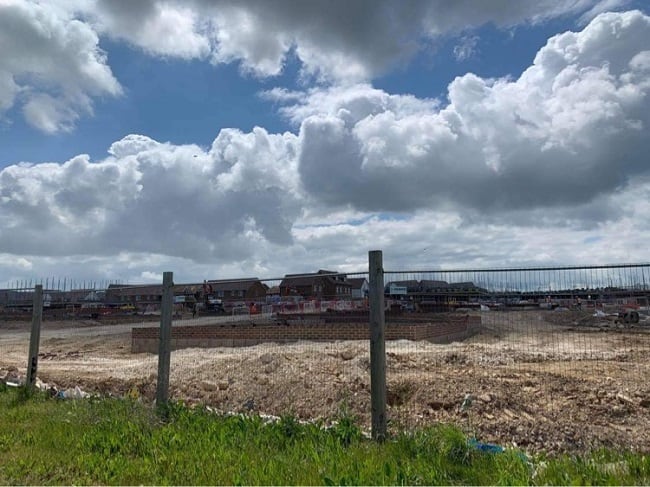
Written by Sarah Bowers on behalf of the Westgate and Garlinge Action Group against Houses on Farmland
The Westgate & Garlinge Action Group Against Housing Development committee is a group of local residents that have come together because they are passionate about saving and protecting Thanet’s green space for generations to come. The group was set up in a bid to save Westgate agricultural land from being developed for a 2,000 home ‘new town’ on farmland,
Campaigners from Westgate and Garlinge Action Group against Houses on Farmland are calling for Thanet District Council to reassess the local plan to 2031 in consideration of the Intergovernmental Panel on Climate Change (IPCC) report that has been issued this month.
The report states that human activity is impacting the climate and warns of increasingly extreme heatwaves, droughts and flooding, and a key temperature limit being broken in just over a decade. Temperatures will reach 1.5C above 1850-1900 levels by 2040 under all emissions scenarios.
Already the increase in temperature is having a marked impact around the world. Not only are we seeing wildfires in mainland Europe, but warmer temperatures are making it more difficult to grow food. Challenges to our food production systems will be just one of the impacts with changing rainfall patterns leaving many areas vulnerable to drought, while extreme weather will make agriculture harder and damage crops. For example, this year the unprecedented floods in Europe has decimated their potato harvest which means that there is likely to be a shortage of potatoes this year – a crop that Thanet is famous for growing well.

It is vitally important that as a country we are able to grow our own food. In 2019 we were only around 64% food self-sufficient. This compares to 78% in 1984. To put it another way, in 1984 there was enough food produced in Britain to feed the nation for 306 days of the year. Today, that figure is 233 days, making 21 August 2020 the day that the country would run out of food if we were relying solely on British produce. As we respond and adapt to climate change, we must increase our food self-sufficiency. Consequently building on prime arable farmland seems very wrong.

The land in Thanet is special too. Being surrounded by sea on three sides makes it unique for agriculture. It has some of the best and most versatile soils in the UK and has a maritime, relatively frost-free climate. Grade 1 land is limited in the UK and much of it is at risk of coastal flooding. In the southeast for instance, 62% of best and most versatile soil is at risk. However, Thanet has Grade 1 and 2 land that is not at risk from coastal flooding.

Thanet’s Local Plan (adopted in 2020) places 17140 houses within an area of just 40 square miles. Most (around 87%) of these houses will be on productive, high quality farmland. This amounts to the loss of around 700 hectares of precious Grade 1, 2 and 3 land. This decision must be reviewed in light of the IPCC report.

In addition, a key part of the Local Plan is the creation of a new ‘inner ring road’ that will be partly funded by developer contributions. The IPCC report states that fossil fuels are a big part of the cause of climate change so building more and more roads is simply not sustainable. In this country carbon emissions from transport have barely changed since 1990. They are now 28% of domestic emissions, with about 91% of these from road traffic.
We urgently need to reduce emissions if we are to keep the earth’s temperature within safe limits of 1.5C. Building more roads and creating more traffic takes us in the wrong direction and locks us into an unsustainable future. Consequently, the road-building programme that forms a key part of the Thanet Local Plan should be reviewed. We should be investing in better and more reliable public transport instead, encouraging people to use it and getting cars off the roads.
Another concern is the potential for increased surface water flooding if all these houses are built. Our climate is changing and this has become particularly noticeable this year when we have a number of incidents of torrential rainfall that has led to localised flash flooding. This is partly due to our drainage system that simply cannot cope with the amount of rain that we are experiencing. It is also clear that we cannot carry on concreting our land and expect things to improve or even stay the same. We need green space to help manage the increased water flow otherwise flash floods will only get worse.

Dr Jess Neumann, a hydrologist at the University of Reading, said: “Planning and development need to consider flood risk from all sources – river, groundwater and flash floods – and adapt accordingly. It is not acceptable to keep paving over the land and expect the public to deal with the water when it comes into their homes.”
And while on the subject of water then the management of our waste water and sewage deserves a mention. Southern Water have recently received a record fine of £90 million for illegally dumping sewage into the sea. But this is a continuing theme. Every time it rains more ‘waste water’ and effluent gets pumped out around our coast in order to prevent sewage from backing up into residents’ houses. Investment in the billions is needed to upgrade their systems and in the meantime our coastline is regularly polluted, beaches are closed, and local businesses suffer. It seems unlikely that adding a further 17140 houses will help the situation. So until the Southern Water situation is resolved, there should be no further housebuilding in Thanet.
Finally a word on nature and biodiversity. The UK is one of the most nature depleted in the world. The Local Plan will destroy much of our farmland and none of the proposed developments provide proper mitigation for farmland wildlife. Farmland bird numbers have been in steep decline for decades, but the land around Thanet is known to provide a home to these birds. In particular large numbers of skylarks live and nest around our fields every year.

No amount of ‘mitigation’ from developers will adequately replace acres of open, sensitively managed farmland which is needed by these birds for breeding and nesting. Other wildlife that uses the fields and their margins includes several species of bat, buzzards, kestrels, foxes and hares. All of these will be lost or seriously decline in number if all of the proposed developments go ahead.
Overall, given the serious nature of what we are facing, we must come together and plan for a future that will be more sustainable for all of us. Alternative build sites must be carefully reviewed with the aim being to preserve our farmland. Town centres are emptying, can buildings there be repurposed for housing? How many empty homes are there in Thanet?
Do we really need another 17140 houses? And the new houses that we build must be more sustainable and made ready to meet a different future. Should solar panels and rainwater collection be mandatory for example? Should there be less focus on the car and more on cycling and public transport? As more people work from home, should access to fast broadband for everyone be a priority?
Times are changing fast so the Local Plan and its impact on the residents of Thanet must be urgently reviewed and reopened for public consultation. Otherwise what legacy will be leaving our children and grandchildren?
Information sources:
https://www.crowdjustice.com/case/stop-largest-ever-roads-programme/

